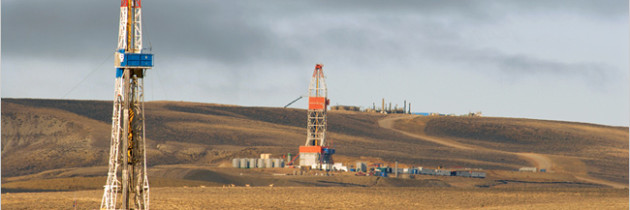Cameron pledges cash for communities to ease path for UK fracking
The pledge, made on Monday, coincides with an announcement by France’s Total that it will spend about $50m on exploring for shale gas in the East Midlands, making it the first oil major to invest in the UK’s fledgling sector. The prime minister said that local authorities will be able to keep 100 per cent of rates they collect from shale sites – up from the usual 50 per cent – amounting to an estimated £1.7m for a 12-well site.
“That’s going to be quite a significant boost for that local council’s coffers,” Michael Fallon, energy minister, told the BBC on Monday. “We want local councils and local people to benefit from this exploration. We expect 20-40 wells to be drilled in exploration over the next couple of years.”
Mr Cameron said that the UK’s governing coalition is “going all out for shale” because it will bring jobs and economic security for Britain.
But it is likely to face strong opposition from grassroots campaigners who worry about the environmental impact.
Critics of fracking – hydraulic fracturing – which involves pumping chemicals, sand and water deep underground at high pressure to shatter shale rock and release oil and gas trapped inside, say it can contaminate groundwater and cause earthquakes.
Rural communities also worry about the effects large-scale fracking operations will have on air quality and local infrastructure, such as roads.
Jane Thomas, of environmental group Friends of the Earth, said the rates move “highlights the depth of local opposition to fracking and the desperate lengths ministers are prepared to go to overcome it”.
“This move raises potentially serious concerns about conflicts of interest, if councils that benefit from this money are also the ones who decide on planning applications from fracking firms in the first place,” she added.
Shale gas explorer Cuadrilla Resources faced angry protests last summer when it tried to drill for oil near the Sussex village of Balcombe, in the constituency of Tory cabinet minister Francis Maude.
Total announced on Monday that it was paying $1.6m to acquire a 40 per cent stake in two exploration licences in the Gainsborough Trough, a geological basin in Lincolnshire, eastern England, that is thought to be rich in natural gas.
High quality global journalism requires investment. Please share this article with others using the link below, do not cut & paste the article. See our Ts&Cs and Copyright Policy for more detail. Email ftsales.support@ft.com to buy additional rights. http://www.ft.com/cms/s/0/3f95493c-7b95-11e3-a2da-00144feabdc0.html#ixzz2qHy5eTUb
It will also commit to funding a $45m exploration programme in the two licence areas, which cover 250 sq km. The existing partners, eCORP of the US, Dart Energy and UK-listed IGas and Egdon Resources will remain in the licences but with reduced stakes.
Patrice de Viviès, Total’s senior vice-president for northern Europe, said: “This opportunity is an important milestone for Total E&P UK and opens a new chapter for the subsidiary in a promising onshore play.”
Total is already involved in shale gas projects in the US, Argentina, China, Australia and in Europe in Poland and in Denmark, he added.
The move follows Centrica’s £160m investment in projects in northern England’s Bowland shale and GDF Suez’s £25m investment in shale and methane projects in Cheshire and the East Midlands.
Ministers believe that a further licensing round this year will bring more entrants to the market.
The announcement by Mr Cameron comes several weeks before the fracking industry is due to publish a paper setting out in more detail how communities will be rewarded for accepting drilling sites.
Last summer, the industry announced that local communities would receive £100,000 when a test well is fracked – with a further 1 per cent of revenues if shale gas is discovered.
That could be worth £5m-£10m for a typical site, with the money likely to be distributed through direct cash payments and the creation of local funds to pay for community facilities.
Yet Conservative MPs have urged ministers to raise that 1 per cent figure in order to galvanise community support.
The Local Government Association said: “One per cent of gross revenues distributed locally is not good enough; returns should be more in line with payments across the rest of the world and be set at 10 per cent.”
In its imminent paper the industry is expected to hold the line on 1 per cent, arguing that it would be risky to promise greater rewards until more research has been done.
“Until we know more about flow rates, the ease of extraction and, ultimately, profit margins it will be hard to know what proportion of turnover is appropriate,” said one industry executive.
Some ministers would like to raise the level of compensation in the long term but concede no increase is likely for now.
Government measures to help stimulate Britain’s fledgling fracking industry include tax breaks that were set out in the Autumn Statement in December.
Ministers have also urged the Environment Agency to cut its permitting times from a typical 13 weeks to two weeks.
Fonte: ft.com



